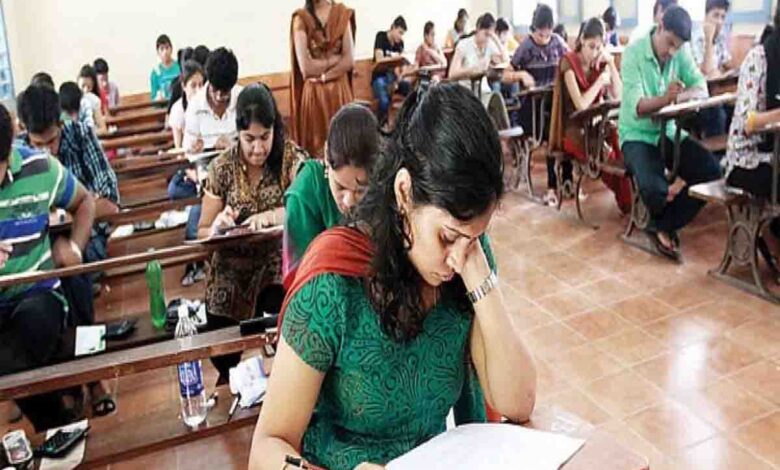GUEST COLUMN : Combating cheating and paper leaks in India

 Onkar Singh
Onkar Singh
Ensuring the integrity of examinations has emerged as a big challenge for quite some time. Each instance of reported breach of the sanctity of examination adversely affects the mental health and academic performance of the examinees. Undoubtedly, those engaged in holding such compromised examinations are getting equally distressed but the continued occurrence of lapses in examinations is resulting in credibility loss which cannot be restored overnight. The beneficiaries getting success despite poor acumen are also devastating the quality of successful ones from the respective examinations. For example, those cheating to get into a premier institution of study in any programme will be bringing down the overall quality of the cohort passing out from the respective institution and their on-job incompetence is likely to have calamitous implications. Under these circumstances, it is inevitable to honestly introspect to figure out the troublemakers and correct the processes for ensuring the veracity of examinations in general and see that the dreams of the young generation working day and night for their wellbeing are not shattered.
Malpractices and unfair means in examinations are attempted to be made formidable through the recently passed Public Examinations (Prevention of Unfair Means) Act 2024 but the results are yet to be seen. Going by the very high stakes of the particular examination, the rogue may strike a trade-off between the advantage of managing favour to few over the punishment levied by the law. The huge volume of money involved in paper leaks and associated breaches of examinations to help few may even surpass the legal threats, calling thereby to have robust fool proof processes and practices in every examination.
A closer look into the reported mischiefs in the examination primarily includes paper leakage before the examination, providing answer keys to examinees for writing in the exam, impersonation, assisting examinees in examination halls during the exam, lackadaisical invigilation during the exam, use of assistive devices for getting solutions during exam, leaving blank answer books for being written after examination, etc. The modus operandi for favouring a few for certain consideration keeps on varying but the involvement of persons engaged in the examination either at pre-examination, examination conduction, or post-examination stages is essentially there. Thence, the key lies in curbing the possibilities of any breach of sanctity at every stage and it is ineluctable to deconstruct the examination stage-wise to identify the probable devilry based on the premise that the examination conducting body is completely sacrosanct in its intentions.
Pre-examination stage
Starting from the announcement of the examination, the preparation stage or pre-examination stage witnesses human interventions for planning and preparing for the conduction of the examination. The call of applications from the candidates is the first step through which the examinees register and at times they try to form their groups appearing at the same examination centre(s) for ease of use of unfair means. Howbeit, the shuffling of the applicants to break any pattern at the time of application helps to fail such clever scheming of seating together. The next critical steps comprise the setting up of the question paper, its moderation, printing, packaging and transporting it to the examination centres. Activity-wise anatomisation shows that the setting up of the question papers and their moderation may be carried out by the subject experts securely but the involvement of anyone for typing, printing, sealing or sending, with dubious intentions can lead to paper leak at this stage itself. Engaging persons with impeccable integrity as subject experts for getting the question paper set, moderated, typed and its secured digital transmission in encrypted form by experts themselves to the printer can ensure no leakage during question paper finalisation. The printing, packaging, and its transportation are done by the agencies performing confidential works for whom these activities earn their bread butter and chances of leakage from this end can be prevented through effective deterrents. Nevertheless, hiring agencies with excellent track records and integrity can eliminate the possibility of leaks from their side. Further, the vulnerability to leaks cannot be ruled out after the handing over of confidential packets of question papers to exam centres prior to the examination. A number of examination centres being too large increase the probability of wicked elements sneaking into confidential space and taking out papers in connivance with exam centre officials for whom it is always a routine one-time activity of getting an examination conducted. Making elaborate arrangements for safe and secure custody of confidential material along with minimising the storage time at examination centres can lessen the probability of leakage from examination centres. Also, the use of technology for directly sending the question paper set and moderated by experts on the computer and digitally sharing it with the examination centres in encrypted form and printing occurring at the examination centres need to be explored to eliminate a few crucial steps of printing, packaging, transporting and secured storage. There are instances of secured transmission of question papers in password protected and encrypted form just before the commencement of the examination and its printing at examination centres in regular examinations.
Examination conduction stage
The successful conduction of examination depends upon the sincerity and commitment demonstrated by the functionaries of different educational institutions designated as examination centres spread across the region. It is a process that involves the examination centre in-charges, invigilators, supporting staff members and security personnel. Under such a situation, the attempt to help examinees by the invigilator(s) or other centre officials is possible. Nonetheless, the rigour of question paper also needs to be increased along with frequent change in pattern of question paper to avert helping examinee at exam centre. With the growing use of generative AI, efforts must be made to isolate the examination premises from internet access to dodge the technology assisted answering and physical barrier for preventing the outsider’s access to examination halls for supplying chits, answers, etc. Leaving blank answer sheets on the assurance of someone else writing it after examination either at the examination centre before packaging or at the level of examination conducting body are the examples of connivance of examinee and examination centre or the examination conducting body. Despite having CCTV surveillance, the conduction of examination at massive scale may pave the way for any mischievous act of helping examinees in one or the other way to perform better. The collusion between examination centre officials and the examinees is a bit difficult to check because of widespread examination conduction in the large number of centres simultaneously. Notwithstanding the malicious intentions of individuals at examination centres, technological solutions can help in effective monitoring of CCTV surveillance to prevent lapses during conduction of examinations.
Post examination stage
After the conduction of examination, the onus of purity of examinations lies upon the examining body to complete the evaluation and result processing. Flawless examination key, accommodating the lapses during exam conduction, if any with rationality and fairness with due regard to merit and public disclosure strengthens the trust of all stakeholders. The heavy surveillance, restricted access, accountable record keeping, expedient evaluation and confidential result preparation can prevent possible complicity. Increased involvement of academics can also reduce the chances of sanctity of exams being challenged.
Way forward
With the frequent reporting of paper leaks and cheating in examinations, it is impending to evolve mechanisms for carrying out each stage of examination with the highest integrity and be ruthless in handling any onslaught upon the probity of examination. In view of the trust deficit between the examining authorities and the examinees, the identification of truthful and upright individuals with sound understanding of examinations must be done for carrying out the pious assignment of holding the examinations. In the transformations of examination processes and practices, looking for the appropriate use of technology can be of great help. It’s high time to put in collective efforts to evolve a robust examination system in the country. It goes without saying that strategies for sustaining the righteousness of examinations have to constantly evolve based on continuous learning from the experiences of unfair practices in every examination. Besides, the shift to multiple exam chances, decentralisation of examinations, enhancing opportunities, etc may be contemplated in respect to the particular examination for reducing the stakes and stress.
(The author is the vice chancellor of Veer Madho Singh Bhandari Uttarakhand Technical University. Views expressed are personal)






